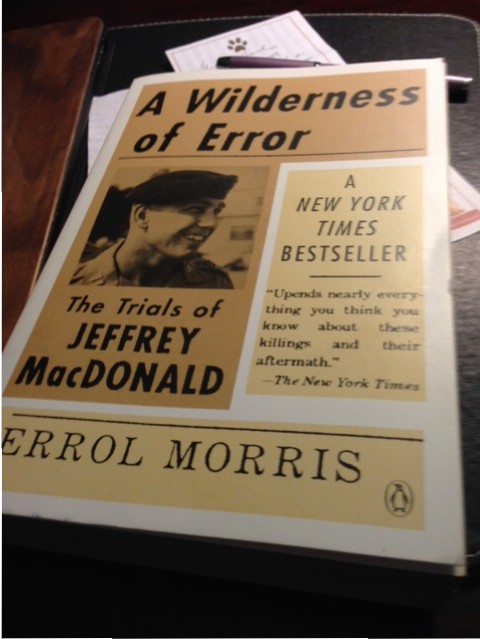A Wilderness of Error:
The Trials of Jeffrey MacDonald
by Errol Morris
Penguin, trade pb, 553pp
Copiously illustrated, extensive notes, indexed
$18.99, ISBN: 978-0-14-312369-9
A Review by Gene Stewart
On 17 February 1970 Army Captain Dr. Jeffrey MacDonald’s wife and two children were murdered and he was stabbed. He was blamed, tried, (in 1979, by the way), and convicted. He remains in prison to this day.
This book proves conclusively he did not get a fair trial. Not even close. It also presents a preponderance of evidence pointing toward his innocence but guilt cannot be apportioned or assigned after all the years, all the obfuscation, and all the layered cover-ups, dodges, and outright lies.
As a consequence, this book, which is so thoroughly detailed, well-organized, and clearly presented as to be a prime example of how to investigate crimes and their aftermaths, ends up being about the so-called justice system. From the ground up, character flaws, malfeasance, incompetence, and bigotry rule.
We learn that narrative counts more than fact. Who ever tells the best story first wins. In law it’s called a theory of the crime, in fiction writing it’s narrative. Imposed, it’s structure on what are usually chaotic events that leave random, often-misinterpreted evidence. A given fact marks the spot where people stop asking questions. It’s shocking to see how fragile our sense of what’s real can be, and how malleable our memories. History is a lie agreed upon, many cynics have observed. It needn’t be a lie. In many cases, it’s a misperception, or a limited angle of view, or just a false conclusion based on false impressions.
“We live in a universe of false leads,” Morris writes at one point. As if the world seeks to mislead us. As if anything BUT plain fact insists upon dominating our view of what we call our world. Whose it is, and what it is, remains up for grabs, as A Wilderness of Error makes clear.
In this particular case, an Army Green Beret medical doctor serving on Ft. Bragg found himself accused of killing his family despite his story of being awakened by a group of what he called hippies attacking him. An amazing amount of evidence was destroyed right off the bat by incompetent MPs tramping around the place, some actually moving things they came across.
Other evidence was kept carefully out of the case by a prosecution in collusion with a bent judge focused on convicting MacDonald. It went so far as to exclude the repeated confession of a woman, Helena Stoekley, who kept telling everyone she’d been there and, although she’d been stoned, she remembered vivid details, many of which only a direct witness would or could know.
Maybe.
Blur was applied so thickly, for so many years, with participants literally remaining in office for 40 years in part to stonewall successive appeals, that no clarity is possible even for the sequence of events. Much evidence has been destroyed by now. Witnesses and participants have died. DNA evidence was eventually processed but what usually takes six months took over eight years to make its way through a reluctant system. Blocks were thrown up at every possible turn, and delays were built in.
Justice, turns out, is maintaining a corrupt status quo, not meting out sentences based on evidence and fair trials.
Like the recent HBO mini-series MAKING A MURDERER, A Wilderness of Error is not so much about an accused man’s guilt or innocence, but about how cops, prosecutors, and judges use the system for their own ends without regard to the ideals supposedly enshrined in a Rule of Law.
Errol Morris is a documentary film maker. The Fog of War; The Thin Blue Line; Mr. Death; A Brief History of Time; The Unknown Known are all his work, with many others. He’s won awards and has, in The Thin Blue Line, gotten a wrongfully-convicted man out of prison.
Not so here. He did not find overwhelming evidence either way, but most of what was excluded without conscience from MacDonald’s trial was exculpatory, and as I’ve said, this book proves without doubt a fair trial was not conducted, not even the appearance of one.
You will also come away from A Wilderness of Error knowing how treacherous and disingenuous author Joe McGinnis was in his book Fatal Vision. Yes, it’s that case, and in fact that book and subsequent mini-series made sure a false narrative was imposed, removing any chance of a fair trial while convincing most of us at the time that, oh, yes, of course that’s what happened, just another one of those types of things…
Morris, a film-maker, demonstrates in A Wilderness of Error a remarkable ability to sift, organize, and present a baffling array of evidence, claims, and conflicting testimony in a clear, readable way. This is some of the best reporting I’ve ever come across. The book’s layout helps, too. Each chapter has but a single focus. Quotations and excerpts are well marked. Morris writes concisely. He maintains admirable balance amidst dizzying swarms of accusation and dissembling.
If you like true crime, if you like intelligent analysis of criminal law processes and media frenzies, if you are interested in seeing how the muddle of life becomes selected, even cherry-picked history in our minds, or if you like philosophical existentialism presented without preaching using real world examples, this book will compel you.
Strongly recommended for those of us angry at the corruption.
/// /// ///

